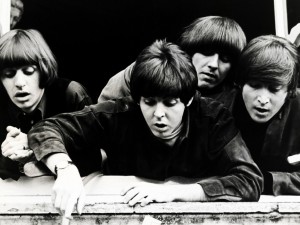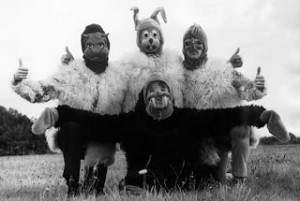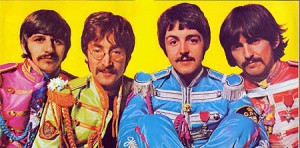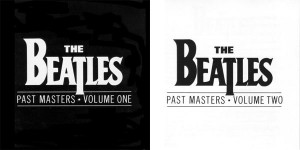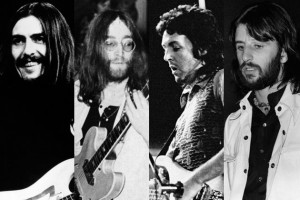 “You don’t discover [The Beatles], you reclaim them… You have to take [them] back from everyone who’s admired [them] before and find your own way in, even if what you’re really looking for in the music is the same thing those old admirers found there.” – Alex Pappademas
“You don’t discover [The Beatles], you reclaim them… You have to take [them] back from everyone who’s admired [them] before and find your own way in, even if what you’re really looking for in the music is the same thing those old admirers found there.” – Alex Pappademas
What, in the name of Saving Private Ryan, could I say about John, Paul, George, and Ringo that hasn’t been said dozens, if not hundreds, of other times?
What discussion could I contribute to The Beatles’ significance that would further expound on everything they’ve added to music and to western culture?
Nothing.
But maybe there are one or two of you who are relative Beatles newbies. Maybe I can give you an elegant introduction to the way I see them.
Or maybe the rest of you are curious how one huge fan came to “reclaim” the greatness of The Beatles on his own, in his own words.
(Or maybe I just want to write about them, audience be damned.)
Here’s how I experienced The Beatles: First, I knew a couple of their songs from the radio. Then, I knew about thirty of their songs after my dad bought me their greatest hits album 1 for my twelfth birthday.
And then, after reading so much about how significant and great The Beatles were for a half decade (and also really enjoying just about every song I’d heard), when I was about nineteen, I decided it was time I really get to know The Beatles. I spun all twelve of their records from beginning to end, making notes and lists on the way.
Thus, the rest of this article will be broken into two parts: A breakdown of many of the ways that The Beatles were great, and a journey through their albums.
Ways in which The Beatles are great:
1) The Beatles, by general critical consensus, created the greatest music of the rock ‘n’ roll era.
This may seem an obvious statement, but it’s this basic observation I want to start with: The Beatles created a massively artistic, compelling oeuvre of hundreds of songs.
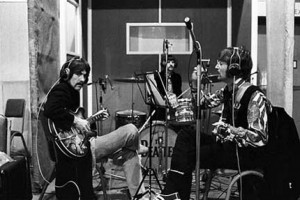 2) The Beatles were the most technically innovative musicians of the rock ‘n’ roll era.
2) The Beatles were the most technically innovative musicians of the rock ‘n’ roll era.
Really, you can make a case that they were the most innovative musicians since Beethoven. With every album (up through maybe their last two), The Beatles broke down more and more barriers, setting precedents that still define the industry today.
When The Beatles recorded their first album, Please Please Me, rock ‘n’ roll music typically consisted of two guitars (one lead, one rhythm), drums, and bass. Rhythm guitar or bass usually sang.
Within a few years, the very notion that bands had to even use traditional instruments seemed oppressive.
Before The Beatles, few questioned that recorded music had to be replicatable live.
The Beatles gave up performing live about halfway through their career so they could focus on figuring out how to make their albums as compelling as possible.
In other words, The Beatles used their albums as a canvas that they could manipulate any way they pleased rather than a recording of the group playing their songs live.
Their contributions on a technical front are vast, and basically every genre of music (until punk popped up in the ‘80s) were indebted to the paradigm shift The Beatles initiated.
3) The Beatles were the most beloved group in the world and in the history of the rock ‘n’ roll era.
The Beatles have sold approximately a billion records since 1963. A BILLION. That means one in six people in the world – including the piss-broke residents of Haiti and the Dominican Republic – have purchased a Beatles record.
There is simply a very limited amount of culture that has so been so broadly propogated.
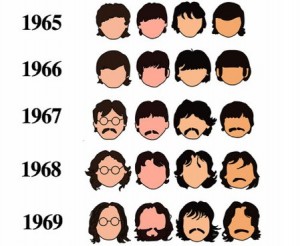 4) The Beatles were the most culturally influential rock group of all time.
4) The Beatles were the most culturally influential rock group of all time.
Everything The Beatles did was important simply because they were The Beatles. In this way, the group’s fame was self-perpetuating: First, some people cared what the band did because they made good music. Then, more people cared what The Beatles did because they were curious why the other people cared so much. Then the band was officially “famous” and everyone cared what The Beatles did because everyone cared what The Beatles did.
And it was everything: What they looked like, where they were, what they admired and badmouthed, what they had to say about religion, what culture they consumed and appropriated, what drugs they took, etc.
(I’m less interested in this aspect of The Beatles than some of the others, but if you’re curious, Wikipedia has an incomplete documentation of the topic.)
5) The Beatles were great because they were among the first (and arguably the best) at creating a vastly diverse sound and type of record.
Most artists fall pretty neatly into genres. The Beatles did at the start of their career, too, abiding by “Merseybeat” norms, but with a slightly harder hitting and cleaner timbre.
It took about two albums for The Beatles to start carving out something more amorphous, and two more albums before the band really started dabbling with eclectic genres and styles, fusing them into consistently compelling pop hooks.
And then it got more intensely weird and broad from there. Rubber Soul is the last album to sound fairly homogenous, but even there the Four were clawing at the limits; one song built its melody around a sitar riff, and another borrowed heavily from Greek music.
But Revolver really broke the levee, with blasts of dozens of styles coming in on all sides in an unprecedented way. As Stephen Thomas Erlewine wrote, “the biggest miracle of Revolver may be that the Beatles covered so much new stylistic ground and executed it perfectly on one record, or it may be that all of it holds together perfectly.”
Later albums like Sgt. Pepper’s and “The White Album” incorporated even more styles so that basically everything this side of Bach had made its way into a Beatles song.
Some artists genre-hopped before The Beatles, but none blurred the lines of genre in quite the same way.
6) The Beatles were great because their success was so multitudinous.
There are few instances in the history of western culture where an artist is at once the most loved by the populace, the critics, and their fellow artists at the same time.
The Beatles galvanized a generation, created an immensely enjoyable work of art still appreciated by a billion+; they helped (along with the likes of JFK and Muhammad Ali) usher in a new type of famous that we today call celebrity; and they changed the face of popular music.
We’ll never again see anything again quite like it in the fractured, disperse industry that music has become.
(There are many other ways The Beatles were great — like how they did all of this in just 7 years and how they changed the nature of rock songwriting to make non-romantic songs commerically viable — but I’m going to wrap it up here and move to the next section.)
A walk through The Beatles career
As I said in the intro of this piece, I experienced The Beatles discography chronologically (minus the greatest hits). It was one of the great decisions I ever made. Starting at the beginning and paying close attention to their evolution, rather than jumping around with the supposed “greatest” albums, made it a lot more satisfying to listen because it gave me an appreciation of the way the band developed over time.
Thus, I want to share my thinking of The Beatles through time and honor a few of my favorite songs.
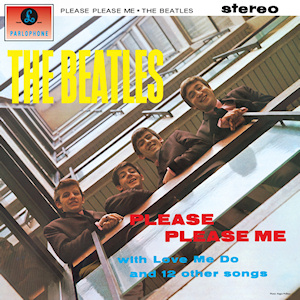 Please Please Me (March 1963)
Please Please Me (March 1963)
Most of it was recorded in a day after the group’s promo singles blew up. The best tracks here are the hardest hitting – especially the opener “I Saw Her Standing There” and the closer “Twist and Shout” – while the originals and covers that are more squarely pop than pop-rock tend to be “pleasant” instead of “great.”
Top 3 tracks:
- 3. “Please Please Me”
- 2. “Twist and Shout”
- 1. “I Saw Her Standing There”
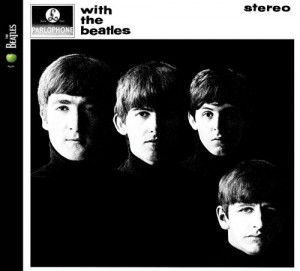 With the Beatles (November 1963)
With the Beatles (November 1963)
A follow up that, in median, is better than Please Please Me, but never peaks quite as high (except “All My Loving”). The style is still the same – harmony-heavy pop with splashes of rock-driven guitar – and the polish is slowly coming together.
Top 3 tracks:
- 3. “Little Child”
- 2. “It Won’t Be Long”
- 1. “All My Loving”
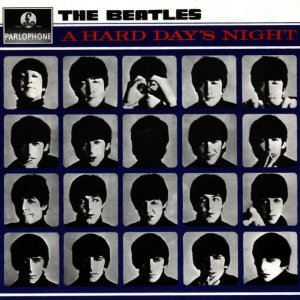 A Hard Day’s Night (June 1964)
A Hard Day’s Night (June 1964)
This is where things really started to get interesting. They hadn’t made “The Leap” yet, but their ambition and trajectory towards greatness became apparent here.
For one, the songs are better. The lyrics, while still all about young love, began approaching the topic in more original, unexpected ways. For once, the ballads and midtempo numbers sound just as good as the rockers.
The sound, too, is much improved, with a richer timbre and more color and flavor. (This is probably most famous on the legendary opening chord of the title track.)
Lastly, perhaps most importantly, and definitely most surprisingly (given that this was a film soundtrack), A Hard Day’s Night is great because it feels constructed as a whole album where every song has its place. This isn’t just a collection of tracks, it’s a flowing whole.
Top 3 tracks:
- 3. “Tell Me Why”
- 2. “A Hard Day’s Night”
- 1. “And I Love Her”
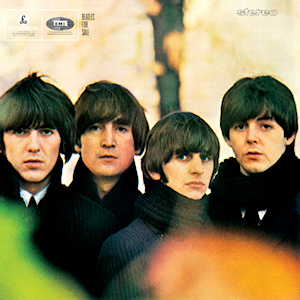 Beatles For Sale (December 1964)
Beatles For Sale (December 1964)
Some people call it the band’s worst album. I’d disagree, but it definitely feels a bit like an oddity.
Dark and country-tinged, Beatles For Sale is light on iconic songs and heavy on solid album tracks. But the performance craft is a new high for the band, particularly in the sublime vocal harmonies.
Top 3 tracks:
- 3. “No Reply”
- 2. “Eight Days a Week”
- 1. “What You’re Doing”
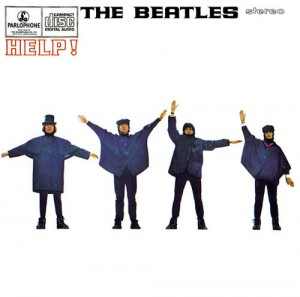 Help! (August 1965)
Help! (August 1965)
If not as unified as A Hard Day’s Night, The Beatles’ second film soundtrack is even more dense with great tracks and sonic development for the band.
You can hear some of The Beatles’ brief infatuation with country linger on tracks like “Act Naturally” (a great Ringo-voiced number), but elsewhere the songwriting is heading more towards the sonic and creative sprawl that would highlight the next few albums.
Still, this has the two best songs yet by the band, and it’s an obvious jump forward.
Top 3 tracks:
- 3. “Ticket to Ride”
- 2. “Help!”
- 1. “Yesterday”
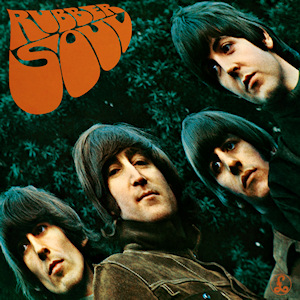 Rubber Soul (December 1965)
Rubber Soul (December 1965)
My personal favorite Beatles album by a country mile. Everything the band had built towards in their first five album crests here before crashing down in the heavy experimentation of the next few albums.
Side one is the most flawless stretch of seven songs I’ve ever heard, but the best song of the album, “In My Life” — a gorgeous, contemplative ballad — is tucked in the middle of the second side. Beautiful, rich, and heartfelt, Rubber Soul is a masterpiece and easily one of my ten favorite albums.
Top 3 tracks:
- 3. “Drive My Car”
- 2. “Michelle”
- 1. “In My Life”
 Revolver (August 1966)
Revolver (August 1966)
One of the most important rock albums, and also one of the greatest. It’s my second favorite Beatles set behind Rubber Soul.
It’s tough to know where to begin when everything sounds like nothing before it, pumped with strange noises and sounds, building to the apocalyptic “Tomorrow Never Knows.”
Just as crucial as the sonic development of the band is the songwriting: Structures are less typical than ever, and few of the songs are about romance.
Where Rubber Soul is cozy and consummate, Revolver is dizzying and dense.
Top 3 tracks:
- 3. “For No One”
- 2. “I’m Only Sleeping”
- 1. “Tomorrow Never Knows”
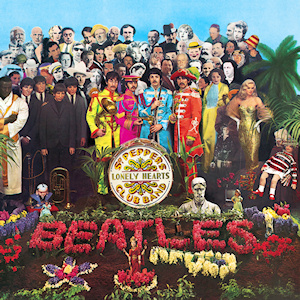 Sgt. Pepper’s Lonely Hearts Club Band (June 1967)
Sgt. Pepper’s Lonely Hearts Club Band (June 1967)
Taking the experiments of Revolver even further, Sgt. Pepper’s is a gargantuan monument of an album, gleefully bouncing from chamber pop to Hendrix-esque jams to eerie, Velvet-esque contemplations. “A Day in the Life” managed to bring it all together, topping even “Tomorrow Never Knows” as perhaps the greatest album-closer ever.
I don’t enjoy it quite as much as the previous two albums, but I admire it even more.
Top three tracks:
- 3. “Lucy in the Sky With Diamonds”
- 2. “A Little Help From My Friends”
- 1. “A Day in the Life”
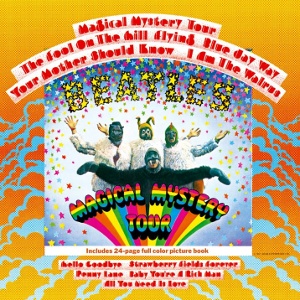 Magical Mystery Tour (November 1967)
Magical Mystery Tour (November 1967)
The Beatles third soundtrack ramps up the psychedelica and trippiness, but scales back the ambition and intra-album flow.
Thus, it’s not quite as bewilderingly great as Revolver or Sgt. Pepper’s, but the songs, in mean, are much more listenable on their own.
In fact, you can make a case that this, track for track, MMT is one of The Beatles’ two or three best albums. It just doesn’t quite feel that way if you listen to it end to end after listening to their previous three efforts.
Top three tracks:
- 3. “Fool on the Hill”
- 2. “I Am the Walrus”
- 1. “Strawberry Fields Forever”
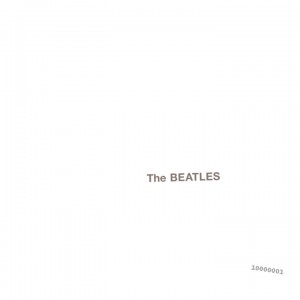 “The White Album” (November 1968)
“The White Album” (November 1968)
What a loony bin, catastrophe of a seminal album. The Beatles’ self-titled album, more commonly known as “The White Album,” shows the band fracturing and indulging in their every musical whim, whether or not the result was a truly compelling song.
There are lots of really intriguing sounds and ideas here, but several dead ends that I only listen to when I want to take in the kaleidoscopic explosion that is this album.
John and Paul, usually the main songwriters, seem particularly lost in their own heads, each providing a few treats but more head-scratchers.
Leave it to George, then, to pull out the album’s genuine masterpiece: “While My Guitar Gently Weeps”.
Top three tracks:
- 3. “Sexy Sadie”
- 2. “Blackbird”
- 1. “While My Guitar Gently Weeps”
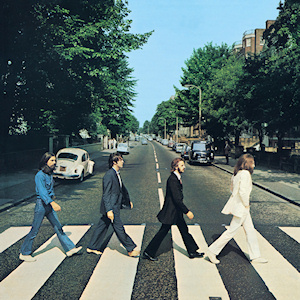 Abbey Road (September 1969)
Abbey Road (September 1969)
The Beatles knew they were done as they struggled to complete the album they had tentatively titled Get Back (later to become Let It Be), thus they decided to put those songs aside and record one polished album like they used to: Clean, catchy, unified, and undeniably great.
Abbey Road ranks among The Beatles’ most listenable albums, full of instant classics that remind you how great the band was when working inside a comfortable box.
This has the unfortunate effect of sounding a bit safe and calculated like no other Beatles album, but it’s hard to hold it against them when the product is so entertaining. (Especially from emerging songwriting genius George Harrison.)
Top 3 tracks:
- 3. “Come Together”
- 2. “Here Comes the Sun”
- 1. “Something
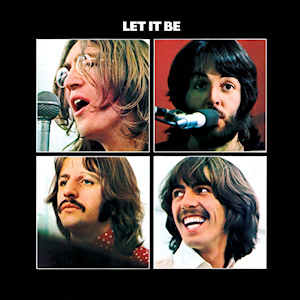 Let It Be (May 1970)
Let It Be (May 1970)
The worst and most confusing Beatles album. Of course, a few of the tracks are undeniable masterpieces, especially the title track, but – listening to the albums in chronological order – Let It Be feels more like a boondoggle than a career-capper for a band with an otherwise untouchable streak of greatness and steady improvement.
Many songs feel too short or too long, and the whole thing fails to really hold together in any compelling way. But, at its best, Let it Be is a showcase of what we were about to lose: the greatest collection of songwriting and band chemistry in the history of rock and roll.
(I slightly prefer the lightweight, McCartney-endorsed remix Let It Be… Naked).
Top 3 tracks:
- 3. “Get Back”
- 2. “Across the Universe”
- 1. “Let it Be”
Past Masters
The Beatles released many of their best songs just as singles, and collections of these singles have been released in various formats through the years. I recommend the 2009 remaster of 1988 collection Past Masters, a two-disc album that is an embarrassment of riches. The second Past Masters disc would almost certainly be the best Beatles album if it had been released as original material, even if you exclude single mixes of songs on other albums. Past Masters is just as essential as any other Beatles album.
Top 3 tracks, vol 1:
- 3. “I Feel Fine”
- 2. “She Loves You”
- 1. “I Want to Hold Your Hand”
Top 3 tracks, vol 2:
- 3. “Paperback Writer”
- 2. “Revolution”
- 1. “Hey Jude”
Post-Beatles Careers
Of course, The Beatles didn’t disappear when they disbanded in 1970. Each of the Four (along with many of their family members) went on to solo careers. Lennon burned bright and died young, assassinated in 1980. McCartney had the most sustained success; if you consider just his post-Beatles career, he’s a top 20 all-time musician in Billboard success. Harrison seemingly devoured his entire creative spark in the intense triple album All Things Must Pass. And Ringo was… Ringo.
Top tracks:
- George Harrison – “My Sweet Lord”
- Paul McCartney – “Maybe I’m Amazed” (hat-tip to the first half of “Band on the Run”)
- John Lennon – “Imagine” (hat-tip to “Instant Karma”)
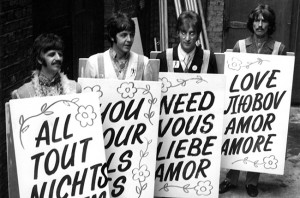 In Conclusion
In Conclusion
I guess that wraps it up, and it still feels like I’m only scratching the surface. I made almost no mention of the way each band member’s personality bubbles to the surface at different times, or how the band was often quite funny, or how there was no set frontman, or how they often parodied/borrowed from other great musicians of the time, or… etc.
Let’s just leave it at this: I love The Beatles. I appreciate their profuse greatness. I highly recommend you listen to their albums, Please Please Me through Let It Be, if you haven’t before (all available on YouTube). And I fully endorse the traditional viewpoint that The Beatles are the most accomplished, significant, and essential rock band of all time.


